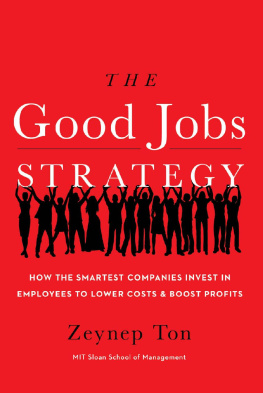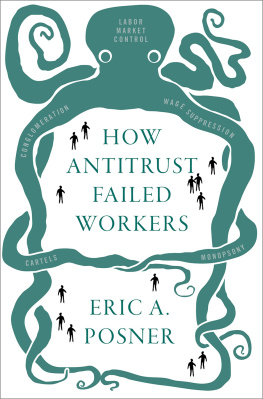PROFIT PARADOX
The Profit Paradox
HOW THRIVING FIRMS THREATEN THE FUTURE OF WORK
JAN EECKHOUT
PRINCETON UNIVERSITY PRESS
PRINCETON & OXFORD
Copyright 2021 by Jan Eeckhout
Princeton University Press is committed to the protection of copyright and the intellectual property our authors entrust to us. Copyright promotes the progress and integrity of knowledge. Thank you for supporting free speech and the global exchange of ideas by purchasing an authorized edition of this book. If you wish to reproduce or distribute any part of it in any form, please obtain permission.
Requests for permission to reproduce material from this work should be sent to
Published by Princeton University Press
41 William Street, Princeton, New Jersey 08540
6 Oxford Street, Woodstock, Oxfordshire OX20 1TR
press.princeton.edu
All Rights Reserved
Library of Congress Cataloging-in-Publication Data
Names: Eeckhout, Jan, author.
Title: The profit paradox : how thriving firms threaten the future of work / Jan Eeckhout.
Description: 1st Edition. | Princeton : Princeton University Press, 2021. | Includes bibliographical references and index.
Identifiers: LCCN 2020052907 (print) | LCCN 2020052908 (ebook) | ISBN 9780691214474 (hardback) | ISBN 9780691222769 (ebook)
Subjects: LCSH: Labor market. | Manpower policy. | Business enterprises Technological innovations. | Work. | Wages. | Working class.
Classification: LCC HD5706 .E35 2021 (print) | LCC HD5706 (ebook) | DDC 331.1dc23
LC record available at https://lccn.loc.gov/2020052907
LC ebook record available at https://lccn.loc.gov/2020052908
Version 1.0
British Library Cataloging-in-Publication Data is available
Editorial: Joe Jackson, Josh Drake
Jacket/Cover Design: Karl Spurzem
Cover lettering: Shutterstock
The trouble with competitions is that somebody wins them.
GEORGE ORWELL
Labor was the first price, the original purchase
money that was paid for all things.
It was not by gold or by silver, but by labor,
that all wealth of the world was originally purchased.
ADAM SMITH
CONTENTS
Introduction
IT WAS LIKE a science fiction movie. While I was on another phone I saw Erin, who was a few thousand miles away, enter my daughter Elenas smartphone and move around among apps to troubleshoot. The high-speed data transmission was not working, and I had called technical support. After talking to several lower-level technicians who each did the same checks, switching the phone on and off or toggling the carrier settings, I was transferred to Erin, a senior technical advisor. It was pretty clear that she had a deeper knowledge of the technical characteristics of the device, and she asked me to change settings I was not even aware existed.
She spoke with an emphatic and confident voice, further accentuating her technical know-how. She gave the impression from the first instant that she would be able to resolve the issue. And she did. As a senior technical advisor, Erins job is to analyze issues lower-level technicians cannot resolve. She gets the hard technical problems. In all we had four phone conversations for a total of more than three hours spread over several days. During that time she got several other people on the phone, including the telecom provider, to find out if it was an issue with the SIM card. At stages where she could not resolve a particular technical issue, she would do research and call me back the following day. In the end, she found out what the problem was: one batch of an older-model phone was incompatible with the newest SIM technology.
After everything was done, I wondered why it made business sense for a senior technical advisor to spend over three hours on the case. Surely her hourly costher wage, the employer contribution, and the overhead associated with her work spacemust be considerably higher than the replacement cost of the older-model smartphone, which at that point was sold for around $300, but the production cost to the company must be substantially lower, estimated to be around $150. Why not spend $150 on a replacement phone instead of spending the high labor cost of a skilled technical advisor? Additionally, to compensate for the technical failure and the time it took to resolve the problem, the company even let me choose a $150 accessory from their store. After the issue was resolved I asked Erin to talk outside the troubleshooting environment in order to find out.
Erin has two bachelors degrees, one in journalism and one in social psychology from different universities. She also has a masters degree in sociology from another university, where she was a teaching assistant. When I first talked to her, I was surprised to learn that she had no schooling in engineering or the sciences. She told me that personal skills are the most important asset necessary to earn a promotion.
These social skillswhich include things such as being able to show empathy or to understand the situation a customer is incant really be learned at school, in part because they are rarely taught. Erin described people getting angry on the phone, which required all her composure to remain even-tempered in order to deescalate the situation without taking things personally. The technical skills came later and required no formal education. Once you got the customer in the right place, you could comfortably get to the technical issues.
When she first took the job, she started at the bottom of the ladder, and within less than a year she had made her way to the highest technical advisor level. Despite being at the highest technical level, she didnt supervise others. Lower-level technicians passed problems on to her but they did not report to her.
After finishing her graduate degree and enjoying life in New Mexico, Erin decided to stay on as a technical advisor. The local establishment of her company had only one client, a large smartphone company. While the smartphone manufacturer outsourced the technical support work, the parent company closely monitored the operations and set the quality standards of the service provided. Externally it looked like the parent company interacted with the customer: the technical advisors identified themselves with the name of the parent company, and their email addresses ended in @the-parent-company-name.com. The technical support they provided was by telephone, email, and by remotely accessing a customers device.
Work was closely monitored and measured by all kinds of metrics, such as the average duration of the handle time, the after-call time, whether the technical advisor kept the commitment to a scheduled outcall, and of course by customer surveys.
Calls were recorded, and the representatives of the smartphone manufacturer listened in. The physical environment, as it was before the COVID-19 outbreak at least, was unappealing, with a lot of people crammed into a large open space. To get a space to work, you had to arrive early. Still, Erin said, the interaction with coworkers was very pleasant. You could ask colleagues questions on how to handle difficult problems, management was friendly, and the trainers were extremely helpful. It is definitely a lot more pleasant than working for small companies, which I did through a temp agency. In a way, it is much less impersonal here in such a giant service firm dotted with half-cubicles than in those small firms. But the company management in those firms is much more aggravating.
With two bachelors degrees and a masters degree, Erin is highly educated, in the top 15 percent of US citizens in terms of education. But years of schooling is of course not the best measure of productivity. Many without college degrees earn outrageous amounts of money on Wall Street, and others with advanced degrees in the arts wait tables. Erin is doing a technical job and has excellent social and interpersonal skills, but despite her job title as a senior technical advisor, the substance of her job does not require higher education. She does this job because she cannot find a more gratifying job for which she has trained.









